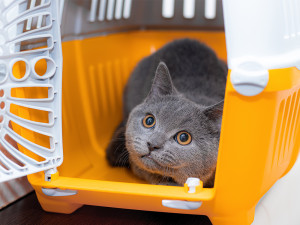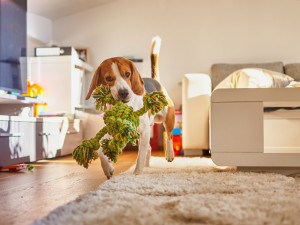Fire Safety & Dogs: How to Prepare for a Fire
A reminder to stay diligent on National Pet Fire Safety Month.

share article

Your pet wants you to read our newsletter. (Then give them a treat.)
Most people probably don’t think much about cats jumping on the counters and dogs zooming around the house, but while it sounds strange, it can be easy for a cat or dog to turn on the stove accidentally. According to the National Fire Protection Association, nearly 1,000 house fires each year are accidentally started by pets and animalsopens in a new tab. Sadly, an estimated 500,000 pets are affected by home fires each year because their pet parents did not have a fire plan in place. Here are a few ways to prepare your home for National Pet Fire Safety Day.
Create a Pet Fire Safety Plan
Helen Woodward Animal Center (HWAC) is no stranger to the extreme danger wildfires can cause petsopens in a new tab. The Bernardo Fire blackened hundreds of acres and forced the evacuation of all 400 HWAC animals, from dogs and cats to chickens, desert tortoises, and alpacas. The following tips from HWAC will help you create a fire plan for your pet and help protect your home from accidental fire:
Include pets in your escape plan.
Create an escape plan and practice it regularly. Someone will need to be in charge of getting your dog out of the house. If your pets have items that would be hard to obtain when escaping a house fire (medicine, special food, etc.), make sure to prepareopens in a new tab a small supply in the trunk of your car for emergency escapes.
Watch pets around flames and in the kitchen.
Don’t leave your pets unattended around an open flame, and make sure to extinguish any open flame before leaving your home thoroughly. Be sure to remove stove knobs or protect them with covers before leaving the house for long periods of time to prevent your pet from causing an accidental fire.
Beware of preventable fire starters.
Invest in flameless candles, these candles contain a light bulb rather than an open flame and take the danger out of your pet knocking over a candle. Avoid glass water bowls on wooden decks because the sun’s rays, when filtered through glass water bowls, can heat up and ignite the wooden deck. Choose stainless steel or ceramic bowlsopens in a new tab instead.
Keep pets near entrances when you’re out.
Keep collars and leashes at the ready in case firefighters need to rescue your dog. When leaving pets home alone, please keep them in areas or rooms near entrances where firefighters can easily find them. Especially with young puppies, keep them confined away from potential fire-starting hazards when you are away from home, such as in cratesopens in a new tab or behind baby gates in secure areas.
Consider using monitored smoke detectors.
Monitored smoke detectors are connected to a monitoring center and allow emergency responders to be contacted when your pets are trapped. These systems provide an added layer of protection beyond battery-operated smoke alarms.
Make it easy for rescuers to help your pet.
Affix a pet alert sticker or cling and include how many pets are in the home, what types, and any important information for locating them. Keep your pet’s microchip and tags up to date. If your pet escapes without you, having a microchip will make it easier to find them after the fire. If you need a Pet Alert Window Cling, the National Volunteer Fire Council may be distributing them for free through volunteer firehouses nationwide in your area. The ASPCA also distributes “in case of emergency pet sticker”opens in a new tab free on their website.

Daniela Lopez
Daniela Lopez is a digital media specialist and long-time contributor to The Bark.
Related articles
![Gray cat in a yellow pet carrier]() opens in a new tab
opens in a new tabHow to Prepare Your Pet for a Natural Disaster
The East Coast just had a rare earthquake. A vet breaks down what to include in an emergency go-bag for your pet in times like this.
![Man laying on floor playing with dog]() opens in a new tab
opens in a new tabHow to Puppy Proof Your Home
Is your home a danger zone for a new dog? Follow these pro tips.
![dog leaning on laptop while man types]() opens in a new tab
opens in a new tabFor the Record, How to File Your Dog’s Papers
Don’t trust your dog’s important info to your foggy memory.
![Beagle dog fetching a green rope in a dog-proofed living room.]() opens in a new tab
opens in a new tabHow to Dog-Proof Your Home
Our room-to-room guide to get your house in dog-safe shape.




